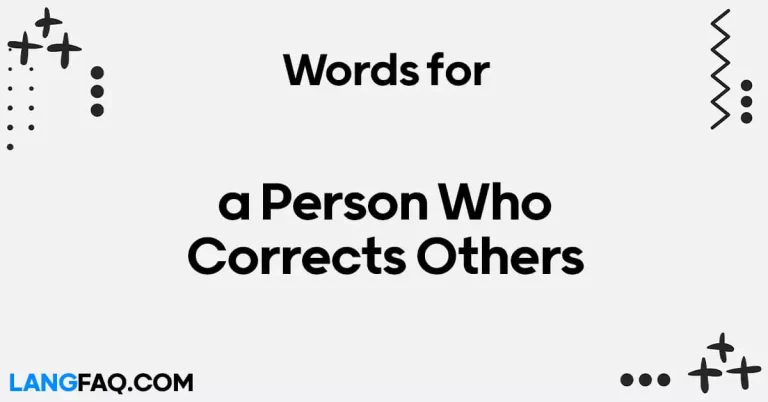Ever wondered what to dub that extraordinary person who effortlessly conquers a multitude of skills and talents?
Well, meet the “Jack of All Trades,” your go-to term for those masters of versatility! But the journey doesn’t stop there. In this article, we’ll unravel a lexicon of words that describe someone who is good at everything, dive into the fascinating world of polymathy, and explore the art of acknowledging and motivating these multitalented individuals.
Get ready for a linguistic adventure that celebrates the true stars among us! 🌟
Key Points We’ll Explore:
- The versatile term “Jack of All Trades.”
- A spectrum of expressions for multitalented individuals.
- Embracing the art of acknowledging and motivating diverse talents.
Imagine encountering a person who effortlessly excels in a multitude of areas, from mastering different skills to seamlessly navigating various domains of expertise. These individuals are the embodiment of versatility and proficiency, leaving us in awe of their abilities.
But what do you call someone who is good at everything? This intriguing question has sparked curiosity for generations, and in this article, we’ll dive into the world of words and expressions that capture the essence of these remarkable individuals.
Defining the Multitalented Marvel
So, who exactly is a person who is good at everything? In essence, they are individuals who possess a unique blend of talents, skills, and knowledge that extend beyond the boundaries of a single domain. They excel in various aspects of life, effortlessly transitioning from one skill set to another, leaving a trail of achievements in their wake. These multitalented marvels are often referred to by different names, and each moniker carries its own nuances and connotations.
The Enigmatic Allure of Multitalented Individuals
The intrigue surrounding people who are good at everything is undeniable. Their ability to adapt, learn, and excel across diverse fields is a testament to the boundless potential of the human mind. We are naturally drawn to these exceptional individuals, admiring their versatility and craving a glimpse into their world of endless possibilities. From ancient scholars to modern-day polymaths, history is replete with examples of such extraordinary beings who have left an indelible mark on society.
The Power of Finding the Right Words
In our quest to understand and appreciate those who excel in multiple areas, we must recognize the importance of finding the right words to describe them. The words we choose not only reflect our appreciation but also convey the depth of their talent and expertise. When we use precise and fitting terms, we not only acknowledge their accomplishments but also inspire and motivate them to continue their journey of excellence.
As we embark on this linguistic journey, let’s explore the various words and phrases that have been coined to capture the essence of someone who is good at everything. From the historical “polymath” to contemporary expressions, we will delve into the world of language and discover how it can shape our perception of these exceptional individuals. So, fasten your seatbelts as we unravel the captivating lexicon of multitalented marvels.
Polymath: The Renaissance Term
Unpacking the Term “Polymath”
You’ve probably heard the term “polymath” thrown around in conversations or books, but what exactly does it mean? A polymath is someone who possesses expertise in a wide range of subjects or fields, making them a true Renaissance person. The word “polymath” itself has its origins in Greek, where “poly” means “many,” and “mathēma” means “learning” or “knowledge.” So, at its core, a polymath is someone who loves to learn and excel in many areas.
Historical Figures: The Epitome of Polymathic Qualities
To truly understand the concept of a polymath, it’s worthwhile to delve into history and discover some remarkable individuals who embodied these polymathic qualities. These historical figures serve as shining examples of what it means to be good at everything:
1. Leonardo da Vinci (1452-1519)
Leonardo da Vinci, often referred to as the “ultimate Renaissance man,” was a true polymath. He was a painter, sculptor, engineer, mathematician, and anatomist, among many other things. His famous works like the Mona Lisa and The Last Supper are a testament to his artistic genius, while his detailed anatomical sketches showcase his scientific curiosity.
2. Benjamin Franklin (1706-1790)
Benjamin Franklin was not only a Founding Father of the United States but also a polymath of the highest order. He excelled in writing, science, politics, and invention. His experiments with electricity and the invention of the lightning rod are just a few examples of his diverse talents.
3. Aristotle (384-322 BC)
Ancient Greece was home to one of the earliest polymaths, Aristotle. He made groundbreaking contributions to philosophy, biology, ethics, and politics. His works laid the foundation for many fields of study and continue to influence scholars to this day.
The Connection Between Polymathy and Being Good at Everything
Now that we’ve explored the concept of a polymath and seen historical figures who embodied it, you might be wondering how polymathic abilities relate to being good at everything. Well, being a polymath is about more than just having knowledge in various areas. It’s about the ability to synthesize information, make connections between seemingly unrelated fields, and apply that knowledge effectively.
Polymaths are not just jacks of all trades; they are masters of many. Their wide-ranging expertise allows them to approach problems from multiple angles, find creative solutions, and adapt to different challenges effortlessly. This adaptability and versatility are key attributes that enable them to excel in whatever they set their minds to, making them the epitome of someone who is good at everything.
In the next section, we’ll explore contemporary terms for multitalented individuals and delve deeper into the world of words used to describe them in today’s vernacular.
Contemporary Terms for Multitalented Individuals
In our quest to define and appreciate those who excel in various domains, we often turn to contemporary terms and expressions that reflect the nuances of their abilities. Let’s explore some of these modern descriptions:
“Jack of All Trades”: Pros and Cons
Jack of all trades, master of none. You’ve probably heard this age-old saying, and it’s often used to describe someone who is good at everything. But what are the pros and cons of using this phrase?
Pros:
- Versatility: It acknowledges a person’s ability to tackle a wide range of tasks.
- Positive Connotation: While it suggests breadth of skills, it doesn’t necessarily imply a lack of expertise.
Cons:
- Incomplete: The second part of the phrase, “master of none,” can cast a shadow on the individual’s abilities, implying that they lack true mastery in any area.
- Stereotypical: It’s a well-worn phrase that may not fully capture the depth and uniqueness of an individual’s talents.
“Renaissance Person”: A Modern Spin on an Old Concept
The term “Renaissance Person” offers a more contemporary take on the concept of polymathy. It harks back to the Renaissance period, a time of great cultural, artistic, and scientific revival, and suggests that the individual possesses a similar breadth of knowledge and skills.
Pros:
- Cultural Reference: It connects the individual to a historical era known for its great thinkers and artists.
- Positive Connotation: It implies a well-rounded and cultured individual.
Cons:
- Narrower Scope: While it captures the essence of someone who excels in multiple areas, it may not encompass all facets of their abilities.
- Potential Misunderstanding: Some may not fully grasp the term’s meaning, leading to confusion.
Other Relevant Expressions in Today’s Vernacular
In addition to the above terms, there are various other expressions used to describe individuals who are good at everything:
- Multitalented: A straightforward term that highlights an individual’s proficiency in multiple areas.
- All-Rounder: Emphasizes competence across the board, indicating that there are no weak links in their skillset.
- Master of Many Trades: Suggests expertise in numerous areas, without the caveat of “master of none.”
The choice of terminology often depends on the context and the level of detail you wish to convey. Each expression has its own shades of meaning, and selecting the right one can help paint a more vivid picture of the individual’s capabilities.
As we explore these contemporary terms, it’s essential to keep in mind that while words can provide a glimpse into the world of someone who is good at everything, they may not fully capture the depth of their talents. In the next section, we’ll delve into synonyms and descriptive phrases that offer a more nuanced view of these remarkable individuals.
Synonyms and Descriptive Phrases
As we continue our exploration of how to describe someone who is good at everything, let’s dive into some synonyms and descriptive phrases that offer a more nuanced perspective on their remarkable abilities.
“Versatile”: Highlighting Adaptability and Skill Diversity
When you refer to someone as versatile, you’re acknowledging their exceptional adaptability and their ability to excel in a wide range of fields. It’s a term that encapsulates the idea of being multifaceted and highly skilled across various domains.
Why “Versatile” Works:
- Adaptability: Versatile individuals can seamlessly switch between different tasks or fields, making them invaluable in diverse situations.
- Skill Diversity: They don’t just have a broad skill set; they are adept at applying those skills effectively.
Example: Imagine a colleague who effortlessly transitions from leading a team meeting to solving complex technical problems and then dazzling everyone with their musical performance at a company event. That’s the kind of versatility that leaves a lasting impression.
“All-Rounder”: Emphasizing Competence Across the Board
The term “all-rounder” paints a picture of someone who is not just good but exceptional in various areas. It implies that there are no weak links in their skill set, and they consistently perform well across the board.
Why “All-Rounder” Works:
- Consistency: All-rounders maintain a high level of performance across different tasks or disciplines.
- No Weaknesses: This term suggests that they excel in every aspect, leaving no room for mediocrity.
Example: Consider a student who not only excels in academics but also shines in sports, leadership, and artistic endeavors. They are truly an all-rounder, impressing both teachers and peers with their well-rounded abilities.
“Master of Many Trades”: Recognizing Expertise in Multiple Areas
While the saying “jack of all trades, master of none” can sometimes cast a shadow, the term “master of many trades” takes a more positive stance. It acknowledges that these individuals have attained a level of expertise in multiple areas without sacrificing mastery.
Why “Master of Many Trades” Works:
- Expertise: It emphasizes that they are not just dabbling but have achieved mastery in various domains.
- Broad Spectrum: This phrase conveys a sense of breadth and depth in their skills and knowledge.
Example: Think of a professional who not only manages a successful career but also excels in hobbies like photography, culinary arts, and playing musical instruments. They are a true master of many trades, showcasing their dedication and proficiency.
As you consider which term or phrase to use when describing someone who is good at everything, keep in mind the specific qualities and achievements you want to highlight. Each expression offers a slightly different perspective, allowing you to tailor your description to suit the individual and the context. In the next section, we’ll explore words with positive connotations that celebrate exceptional talent.
Words with Positive Connotations
Now, let’s delve into a realm of words that not only describe someone who is good at everything but also celebrate their exceptional talents and abilities. These words carry a positive connotation that can truly capture the essence of these remarkable individuals.
“Polymathic Genius”: Celebrating Exceptional Talents
The term “polymathic genius” is a tribute to individuals who not only excel in multiple areas but do so with extraordinary brilliance. It combines the concept of polymathy with the notion of genius, highlighting the remarkable intellect and versatility of these individuals.
Why “Polymathic Genius” Works:
- Acknowledging Excellence: It explicitly acknowledges the exceptional talent and intellect of the individual.
- Elevated Status: By using the term “genius,” it places the person on a pedestal of intellectual prowess.
Example: Think of a scientist who not only makes groundbreaking discoveries in their field but is also a gifted artist and musician. They truly embody the essence of a polymathic genius, leaving a mark on both the scientific and artistic worlds.
“Universal Virtuoso”: Describing Broad Proficiency
“Universal virtuoso” is a term that conveys the idea of someone who possesses virtuosity across a wide range of skills or disciplines. It suggests that their proficiency knows no bounds and extends to various domains.
Why “Universal Virtuoso” Works:
- Versatility: It emphasizes the breadth of their skills and the ability to excel in virtually anything they pursue.
- High Praise: “Virtuoso” is a term typically associated with exceptional talent in the arts, and using it here elevates the individual’s abilities.
Example: Imagine an entrepreneur who not only builds successful companies but is also an accomplished athlete, author, and philanthropist. They are a universal virtuoso, achieving excellence in numerous spheres.
“Multifaceted Marvel”: Portraying an Extraordinary Individual
The term “multifaceted marvel” paints a vivid picture of someone who is not just good at everything but is truly extraordinary in their multifaceted nature. It celebrates their ability to shine in various facets of life.
Why “Multifaceted Marvel” Works:
- Captivating Imagery: It conjures an image of someone with multiple facets, each shining brightly.
- Celebratory Tone: The word “marvel” adds an element of wonder and admiration to the description.
Example: Picture a teacher who not only educates and inspires students but is also a talented musician, dedicated environmentalist, and a compassionate volunteer. They are a multifaceted marvel, leaving a lasting impact on everyone they encounter.
These words with positive connotations not only describe someone who is good at everything but also elevate their status and celebrate their exceptional abilities. When choosing the right word to describe such individuals, consider the level of praise and admiration you want to convey. In our concluding section, we’ll explore the art of complimenting multitalented people effectively and motivate them to continue their journey of excellence.
The Art of Complimenting Multitalented People
As we conclude our journey into the world of words used to describe someone who is good at everything, it’s essential to understand the art of complimenting these remarkable individuals effectively. While words can convey admiration, they can also impact how these individuals perceive their talents and abilities. Here’s how to master the art of complimenting multitalented people:
Choosing the Right Word Based on the Context
Selecting the appropriate word or phrase to describe someone who is good at everything should be a thoughtful process. Consider the context and the message you want to convey. Here are some factors to keep in mind:
- Specificity: Tailor your compliment to highlight their specific accomplishments. If they excel in both arts and sciences, for instance, you might say, “Your ability to combine creativity and analytical thinking is truly inspiring.”
- Depth of Praise: Adjust the level of praise to match their achievements. Reserve terms like “genius” for individuals who truly stand out in their fields, while using more general terms for those with versatile skills.
- Personal Connection: Consider your relationship with the individual. A close friend or family member might appreciate a heartfelt and personal compliment, while a colleague or acquaintance may prefer a more professional tone.
Avoiding Overused Clichés and Stereotypes
While it’s important to praise and recognize multitalented people, it’s equally crucial to avoid falling into the trap of overused clichés and stereotypes. Common phrases like “jack of all trades, master of none” or “renaissance man” can be limiting and may not accurately represent the depth of their abilities.
Instead, aim for authenticity and uniqueness in your compliments. Highlight specific achievements, qualities, or projects that showcase their diverse talents. Avoid relying on generic labels that might diminish the value of their skills.
Encouraging and Motivating Individuals with Diverse Skills
One of the most powerful aspects of complimenting someone who is good at everything is the ability to motivate and encourage them to continue their journey of excellence. Recognizing their achievements can boost their confidence and drive.
Consider offering constructive feedback and support for their various endeavors. Express your belief in their capabilities and encourage them to keep exploring new horizons. For example, you might say, “Your ability to excel in multiple areas is inspiring. Keep pushing your boundaries, and you’ll achieve even greater heights.”
Remember that your words can have a profound impact on multitalented individuals. By providing genuine and thoughtful compliments, you can not only acknowledge their skills but also inspire them to reach new levels of success.
In conclusion, describing someone who is good at everything is an art that requires careful consideration of the words we use. Whether you choose terms like “polymathic genius,” “universal virtuoso,” or “multifaceted marvel,” your compliments should reflect the depth and breadth of their talents. By choosing the right words, avoiding stereotypes, and offering encouragement, you can celebrate their achievements and motivate them to continue their remarkable journey.
Conclusion
In our journey through the diverse lexicon of words and phrases used to describe someone who is good at everything, we’ve uncovered a world of expressions that capture the essence of these exceptional individuals. Let’s take a moment to recap what we’ve learned and appreciate the significance of the words we choose.
A Recap of Various Terms and Phrases
From the historical “polymath” to the contemporary “universal virtuoso,” we’ve explored a range of words and expressions that celebrate the talents and abilities of those who excel in multiple areas. Each term offers a unique perspective, allowing us to paint a more vivid picture of these remarkable individuals.
Encouraging Appreciation for Those Good at Everything
It’s essential to acknowledge and appreciate the talents of those who are good at everything. These individuals serve as sources of inspiration and motivation, showing us that there are no limits to what one can achieve with dedication and a thirst for knowledge. By recognizing their accomplishments, we not only celebrate their successes but also encourage others to reach for their own potential.
The Power of Words in Recognizing and Uplifting Talent
Words have the power to shape our perception of the world and the people in it. When we choose the right words to describe someone who is good at everything, we not only honor their abilities but also contribute to their sense of identity and self-worth. The words we use can inspire, motivate, and elevate those with diverse skills, driving them to continue their journey of excellence.
In conclusion, as you encounter individuals who excel in various domains, remember the richness of the English language and the multitude of expressions at your disposal to describe their talents. Your choice of words can make a significant difference in how these multitalented individuals perceive themselves and their contributions to society. So, celebrate their achievements, offer genuine compliments, and continue to uplift and inspire those who are good at everything.
FAQ
Is there a single word that describes someone who excels in various fields?
Yes, you can use the term “polymath” to describe someone who is good at everything, emphasizing their diverse expertise across multiple domains.
What’s the difference between a polymath and a jack of all trades?
A polymath is highly skilled and knowledgeable in multiple areas, while a jack of all trades has a broad range of abilities but may lack mastery in specific domains.
Can you suggest other expressions besides “Jack of All Trades” to describe versatile individuals?
Certainly! You can use terms like “Renaissance person,” “universal virtuoso,” or “multifaceted marvel” to highlight their talents.
How can I compliment someone who is good at everything effectively?
Acknowledge their specific achievements and qualities, offer sincere praise, and encourage them to continue exploring their diverse talents.
Are there famous historical figures who exemplify being good at everything?
Yes, historical figures like Leonardo da Vinci, Benjamin Franklin, and Aristotle are prime examples of polymaths who excelled in various fields, from art to science and philosophy.







